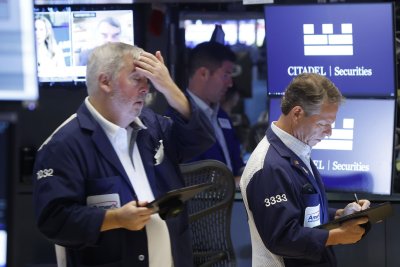
June 23 (UPI) — Oil futures declined and U.S. stock indexes rose despite fears Iran will close the Strait of Hormuz, a key waterway for transporting oil around the world.
Oil prices climbed on Sunday in response to the U.S. joining Israel’s campaign against Iran but investors hope Iran will avoid escalating the situation.
The price of U.S. benchmark West Texas Intermediate Crude oil for August was $68.47, a $5.27 drop from Friday, before American B-2 bombers struck three Iranian nuclear facilities early Sunday.
WTI climbed to $80 per barrel earlier this year but was under $60 per barrel in May. When Russia attacked Ukraine in 2022, prices reached $120 per barrel.
“I think people realize that things in the Middle East will eventually de-escalate and will be in place of a much safer, a much more stable Middle East and world as a whole,” Energy Secretary Chris Wright told CNBC in crediting President Donald Trump‘s foreign policy.
The Dow Jones Industrials, Standard & Poor’s and Nasdaq Composite were all up less than 1%. Of the 11 CNBC sectors, only energy and health declined with Utilities rising the most at 1%.
U.S. gasoline prices have risen, with the national average at $3.22 per gallon, according to the American Automobile Association. That’s up from $3.14 a week ago and $3.20 one month ago.
For every $10 rise in oil prices, inflation goes up roughly 0.4 percentage points and cuts economic growth by roughly 0.1 percentage point, Douglas Porter, chief economist at BMO Capital, estimated.
“As it stands, it is arguably not in Iran’s best interests to close the Strait,” David Oxley, chief climate and commodities economist at Capital Economics, told USA Today.
The Iranian parliament moved Sunday to approve a measure to close the Strait in response to the American strikes on Iran over the weekend. The strait serves as a critical route for oil being shipped from Persian Gulf countries, but ultimately it will come down to whether Iran’s Supreme Leader Ayatollah Ali Khamenei decides to move forward with such a plan.
Close to 30% of the world’s seaborne oil shipments are moved through the strait, which connects the Persian Gulf to the Gulf of Oman and the Arabian Sea. China took nearly 90% of Iran’s crude oil, according to the U.S. Energy Information Administration.
Producers in Saudi Arabia, Iraq, Iran, Qatar and the United Arab Emirites ship crude oil through the strait.
Alternative routes include the Red Sea, but there’s only limited pipeline capacity available, Oxley said.
“Given that most oil flows originating from Iraq, Kuwait, and Iran, itself, can’t be diverted, we estimate that no more than 30% of existing oil flows could be redirected,” Oxley said. “Meanwhile, LNG flows from the region cannot be diverted. The lack of an alternative for rerouting LNG flows has contributed to the sharp rise in natural gas prices since the start of the conflict.”
The United States doesn’t import oil from Iran.
More than half of U.S. crude oil comes from the United States and coastal waters, according to the U.S. Energy Information Administration. For imports, the United States mainly relies on Canada and Mexico to refine oil with less than 10% from Persian Gulf countries.
British Foreign Secretary David Lammy said Monday that closing the strait and striking airbases would be a “catastrophic mistake.”
“It would be a huge, catastrophic mistake to fire at U.S. bases in the region at this time. We have forces in the region at this time,” said Lammy in an interview with BBC Breakfast.
U.S. Secretary of State Marco Rubio also commented Sunday against Iranian interference with movement through the strait. He spoke with Fox News and called on China to prevent Iran from closing the Strait of Hormuz.
“I encourage the Chinese government in Beijing to call them about that, because they heavily depend on the Straits of Hormuz for their oil,” said Rubio, as China is a key oil customer of Iran.
“The Persian Gulf and nearby waters are important route for international trade in goods and energy. Keeping the region safe and stable serves the common interests of the international community,” Chinese Foreign Ministry Spokesperson Guo Jiakun said in a news conference Monday.
“China calls on the international community to step up effort to promote de-escalation of the conflict and prevent the regional turmoil from having a greater impact on global economic growth.”